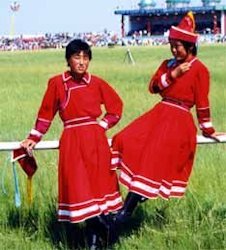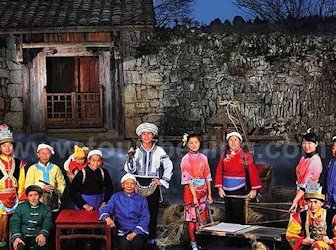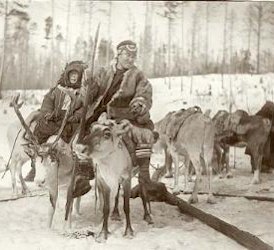|
12. Chinese Nationalities (Ewenki Minority) -- Minorities by Alphabetic Sequence |
||

|

|

|
| Ewenki Ladies | Ewenki Fami;y | Ewenki Couple |
|
"Ewenki" is the self-given name meaning people living in big mountain forests. They used to be called "Suolun, Tonggusi, Yakut," etc in different periods. In 1957, they were officially named Ewenki based on the will of the people. The ancestor of Ewenki people originally lived in the forests northeast of Lake Baikal and along the Shileke River (upper reaches of the Heilong River). They mainly engaged in fishing, hunting and breeding reindeer and have an intimate relationship with the "Shiweis", particularly the "Northern Shiweis" and "Bo Shiweis" and the "Ju" tribes lived in the forests of Taiyuan to the northeast of Lake Baikal in the Tang Dynasty (618 - 907). Later, they continually moved east. One branch came to settle down in the middle reaches of the Heilong River which was known as a "forest people" in the Yuan Dynasty (1271 - 1368) and people "moving on deer's backs" by the time of the Ming (1368-1644). In the Qing Dynasty (1644 - 1911) they were called the "Suoluns" or "Kemunikans" who knew how to use deer. As soon as the Manchu established the Qing, they brought the Suoluns under their control. In 1732, over 1600 soldiers, together with their families were dispatched to the Hulun Buir Grassland. Their descendants are now the inhabitants of the Ewenki Autonomous Banner. Only in the last 25 years have the Ewenki begun giving up their birch-bark and hide tents of migrant hunters for a more settled life. They still hunt, but also breed deer, tend flocks, warehouses, barns, and pens. The Ewenki are found in Heilongjiang Province near the Russian border and in Nei Mongol Autonomous Region. Their religions include animal and ancestor worship, shamanism and lama Buddhism. The Ewenki are a Tungas people who speak a Tungas language. They are part of the Altaic Tungas-Manchu ethno linguistic group. |
||
| Return to Alphabetic List On to No. 13 Minority Gaoshan ⇨ | ||